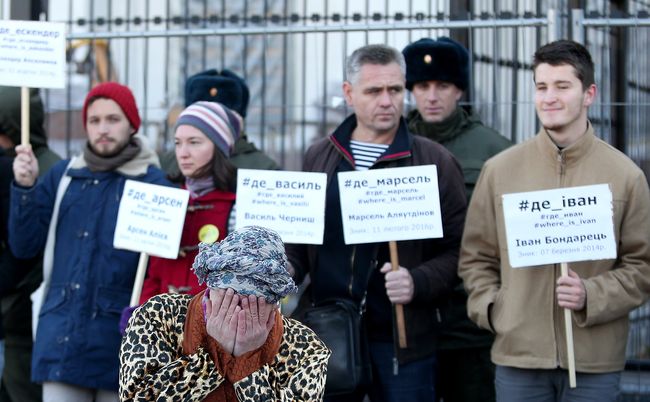“We must prepare for a long struggle”
What can be done for the missing Crimean Tatars
“We have to speak constantly about this problem. Whereas we at least know where the prisoners are, no one speaks about the missing people, we often do not even know their names,” says Tamila Tasheva, co-founder and coordinator of “Crimea SOS” NGO. A picket was held near the Russian Embassy in Ukraine for the fourth time, with the demand to Russian authorities to find the missing inhabitants of Crimea.
RUSSIAN AUTHORITIES WASH THEIR HANDS OF THIS
“Where is Ervin?” This question remains unanswered for five months. Ervin Ibrahimov, member of the regional Mejlis of Crimean Tatars in Bakhchysarai and member of executive committee of the World Congress of Crimean Tatars, was kidnapped near his own home on the occupied peninsula on May 24, 2016. Surveillance cameras recorded people dressed as traffic policemen doing it. The car, which took the man, was also recorded. But we still have no accurate information on Ibrahimov’s whereabouts.
“There were several reports of Ervin. One of them – that he was in Sevastopol, held in a premise, a basement or elsewhere. His parents were told by someone that he would be released immediately after the elections in Crimea [Russian State Duma elections were held on September 18. – Author], but Ervin is still missing,” says Tasheva.
In general, since the annexation more than 20 residents of the peninsula that we know of have been kidnapped, seven of them have been found dead. Tamila Tasheva continues: “We keep writing to Russian authorities on mainland Russia. They query the occupation authorities, and afterwards respond to us that no violations have been registered and the investigations are going on at all occasions.”
The activists appeal to the international community. “For example, in the case of Ervin Ibrahimov and other similar cases we appealed to the UN Committee on Enforced Disappearances. We know thay are doing some work – they entered into communication with Russian authorities on these cases,” adds Tasheva.

OCTOBER 25, 2016, KYIV. A PICKET AND PERFORMANCE AT THE RUSSIAN EMBASSY, IN WHICH RUSSIAN AUTHORITIES WERE REMINDED OF THE MISSING CRIMEANS. “THEY ARE NO MORE, BUT WE ARE,” SAYS THE ORGANIZATION “CRIMEA SOS,” WHICH INITIATED THE EVENT. SINCE JULY, SUCH ACTIONS HAVE BEEN HELD MONTHLY / Photo by Ruslan KANIUKA, The Day
Meanwhile, the question whether the case should be made public or not is a tough one for the missing people’s relatives. “Public statements always involve some risk related to the reaction of the de facto Crimean authorities. We must consider how this risk is justified,” says Maria Gurieva, spokeswoman of Amnesty International in Ukraine. “But in fact it is only global publicity that might change the situation somehow. Although, of course, it is very difficult to affect what is happening on the peninsula from here.”
“THERE ARE MORE REPRESSIONS”
In general, this autumn has become another step in increasing repression against those in Crimea who oppose the annexation. The Mejlis of Crimean Tatar People has been named an extremist organization by Russia; Crimean Muslims have their houses searched and accusations thrown at them of participating in terrorist organizations; there is a criminal case against activist Suleiman Kadyrov on separatism... “Every day something happens in Crimea: trials, searches,” says Tasheva.
The fact that the human rights situation in Crimea gets worse is upheld by Gurieva. Amnesty International has been researching the issue since the annexation, there has been a report on the subject, and now the organization is preparing the next one; the human rights advocates notice a trend. “There are more repressions, people are more scared, more afraid of speaking publicly,” says Gurieva.
Silent men guarding the Russian embassy embody the reaction of Russian authorities at the regular activists’ pickets. However, Gurieva says that it is not that important how Russia behaves in this situation. The Amnesty International spokeswoman in Ukraine is convinced: “These actions are necessary to keep the issue of disappearances in Crimea on the agenda of Ukrainian politicians and the international community; to influence and intensify of international pressure to resolve the problem.”
In October, Liliya Aliyeva, mother of missing Ervin Ibrahimov, has presented an open letter to President Petro Poroshenko through ATR TV channel, asking for help in search of her son. It is unknown whether the head of the state replied to her. But the activists of “Crimea SOS” urge everyone to give her words of support – it can be done via an electronic form at the organization’s website.
As for the actions of Ukrainian authorities – the human rights advocates say that we need to document every violation of human rights in the peninsula and work at the international level, so that it would be possible to punish those responsible for the crimes in the future. “There is the International Criminal Court and other legal mechanisms that can help in solving this problem,” sums up Gurieva. “Sure, it might take a long time. We must be prepared for a long struggle. In addition, we need to work constantly, even without hope to see any immediate result.”
...Meanwhile, a few meters from the embassy, there is an advertisement hanging at a bus stop, promoting bus routes to the peninsula. People – and not always in cases of urgency, for example, on family issues – still travel to the occupied Crimea, in which Ukrainians are being arrested and kidnapped.
Newspaper output №:
№63, (2016)Section
Society





